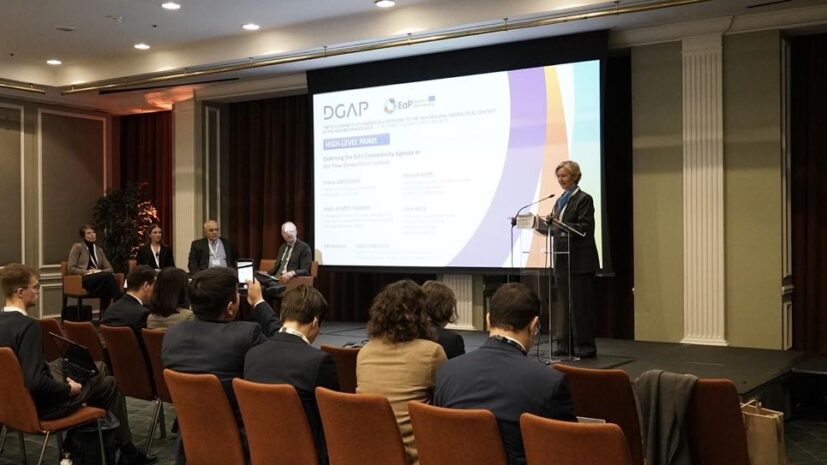
Georgia in Crisis: (Using) Sovereignty As a Shield For Authoritarian Consolidation
Georgia’s ruling political party, Georgian Dream (GD), weaponizes the idea of “regaining sovereignty” to legitimize authoritarian consolidation and a geopolitical shift. GD itself, however, poses a threat to Georgia’s sovereignty and conceptualizes the term as the inviolability of its authority. This ruling party is the architect of economic policies that fail to serve the national interest and actively undermine the economy, concentrating financial benefits in the hands of a powerful minority.
Georgia has been experiencing an acute political crisis since the rigged parliamentary elections of October 2024. The results of the elections have not been recognized internationally, and the ruling GD party, led by the oligarch Bidzina Ivanishvili, is struggling with legitimacy at home. Street protests, fueled by Prime Minister Kobakhidze’s statement on suspending accession talks with the European Union, have been nonstop since then. GD claims to be regaining sovereignty by cutting ties with Georgia’s long-time allies in the West and realigning towards Russia and China.
Alongside its of resisting Western pressure to open a second front against Russia, GD has advanced an openly anti-Western narrative. It opposes perceived Western influence on Georgian culture and traditions. For example, this rhetoric was used to justify the passage of an anti-LGBT law in September 2024.
GD also weaponizes the concept of sovereignty to silence critical opinions at home. A Law on Transparency of Foreign Influence was adopted in May 2024, ahead of the parliamentary elections. Allegedly, its purpose is to ensure transparency in the funding of non-profit and media organizations and to curb foreign influence in Georgian politics. The law was labelled a “Russian law” and widely perceived as a legal instrument of control and repression. Since the October elections, new repressive laws have been passed.
GD is seen as imitating Hungarian-style authoritarianism and might have learnt from Russia’s “sovereign democracy” discourse. Given this, it is important to highlight that GD, a political force primarily concerned with safeguarding its own wealth and security, poses a threat to Georgia’s own sovereignty. Focusing on the economic aspect of sovereignty, this piece argues that GD instrumentalizes sovereignty for oligarchic financial interests, as demonstrated by the examples of the 2024 Offshore Law and government-facilitated cryptocurrency mining.
Sovereignty Untangled
Definitions of sovereignty vary, but two principal conceptualizations can be identified. First, sovereignty as the “power to decide on the exception,” in the Schmittian sense. Second, popular sovereignty, embedded within the structures of legislative authority, wherein the people constitute the source of legitimacy. Wendy Brown argues that sovereignty within liberal democracies functions within a dual register: the routine processes of legitimation, law, and electoral procedures; and the exercise of state power in its capacity to declare exceptions.
Sovereignty encompasses legal, geopolitical, and economic aspects. It is not merely about territorial control; it also manifests through the control of the economy and capital. Further, state sovereignty is not limited to exercising power within the domestic political sphere. How a state positions itself within the global power hierarchy is equally important.
Georgia has limited agency within the regional and global order. Its economy is structurally dependent on foreign capital, currency, technologies, and goods. GD does not show any intention of altering the debt-dependent economic model but seeks alternate sources of capital from countries like China. Severing connections with Western countries will not enhance Georgia’s sovereignty in the international arena. Indeed, it will create new risks.
Georgian Dream as a Sovereign
At first glance, GD’s sovereign authority is formally grounded in the legitimacy conferred by law and electoral processes. However, it has long since ceased to operate within the bounds of legality and constitutionalism. Increasingly, its power is materializing through the capacity to declare exceptions, to place itself above the law, and to disregard legal norms altogether.
Simultaneously, its actions are becoming more transparently directed against the collective interests of the people. The ruling elite regards the country as a form of private property and perceives sovereignty as the inviolability of its authority. GD seeks autonomy from the people, aiming to liberate its actions from the constraints imposed by external demands and domestic dissent. Challengers of this authority are portrayed as “foreign agents” and “enemies of the homeland.”
Looking through the lens of economic sovereignty, it can be argued that GD is the architect of economic policies that fail to strengthen the country’s sovereignty and actively undermine the economy while concentrating financial benefits in the hands of a powerful minority. This is sometimes done by instrumentalizing some key pillars of sovereignty, namely, territory and national legislation.
Offshore Law and the Cryptocurrency Mining Boom
In 2024, through amendments to the Georgian Tax Code, the government exempted the transfer of assets from offshore jurisdictions to Georgia from profit, income, import, and property taxes. The offshore law also allows the repatriation of profits earned in Georgia to offshore jurisdictions without taxation. This law harms the Georgian budget, creates reputational risks for the Georgian financial system, and can turn Georgia into a money laundering hub. This would allow Russian oligarchs, among others, to find a haven for their assets.
Bidzina Ivanishvili himself can benefit from the law to escape sanctions. Transparency International Georgia traced twenty of Ivanishvili’s companies to offshore areas. Ivanishvili is believed to have profited from the offshore law, as he transferred his artwork – worth $480 million – to Georgia, in early 2025.
Like the offshore law, GD used Georgia’s legal infrastructure and territory to create a cryptocurrency mining hub. In 2015, the Free Industrial Zone in Tbilisi was established for the Bitcoin mining company Bitfury, under a 0% tax regime on property, profits, and imports/exports, alongside VAT exemptions on electricity consumption. Ivanishvili’s Co-Investment Fund provided a loan to Bitfury, and the Fund’s advisory board maintained direct ties to Bitfury’s management through shared personnel. Bitcoin mining led to significant electricity consumption, generating the need for energy imports, while scarcely creating employment opportunities or contributing to the state budget.
Threats to Economic Sovereignty
The transfer of offshore assets to Georgia without taxation and cryptocurrency mining does not generate economic benefits for the Georgian state but undermines the national budget and creates risks to the country’s development.
The offshore law introduces risks, such as the inflow of illicit capital into the country, money laundering, financing of terrorism, destabilization of the banking sector, inflation, deepening social and economic inequalities, rising levels of corruption, the distortion of competition in the local market, a reduction in public trust in state institutions, diminished confidence from the international community, and the risk of outflow of domestically earned profits. Unregulated mining and use of cryptocurrency also give rise to a range of risks, including capital flight, the depreciation of the national currency, money laundering, and a decline in public trust towards the national currency.
Sovereignty as a Shield and Instrument
GD’s discourse on regaining and protecting sovereignty operates on two levels. On the one hand, it legitimizes Georgia’s geopolitical realignment; on the other, it marginalizes local civil society groups in an effort to consolidate authoritarian rule.
Simultaneously, GD seeks to consolidate its economic power and create favorable conditions that also allow Russia to benefit from this realignment. Russia’s economic influence on the Georgian economy has grown since the onset of the war in Ukraine and is most likely to increase further. Moreover, Russian capital holds a significant presence in Georgia's energy, heavy and light industry, and transportation sectors.
The instrumentalization of sovereignty by GD is not only a discursive phenomenon but also materializes in a tangible manner, namely, to secure and fulfill the private financial interests of Ivanishvili and his elites. Territory, alongside legislative infrastructure – one of the primary pillars of sovereignty – is used for cryptocurrency mining and the transfer of offshore assets. Ultimately, sovereignty remains a nebulous concept, as distant as the dream of national enrichment promised by the offshore law, and as virtual as the cryptocurrency itself.
________________________________________________________________________
Ia Eradze is a political economist with expertise in economic development, central banking, and Georgia’s financial history. She is currently an associate professor at the Georgian Institute for Public Affairs (GIPA) and a CERGE-EI Foundation teaching fellow. She is also a researcher at the Institute for Social and Cultural Research, Ilia State University (Georgia).



